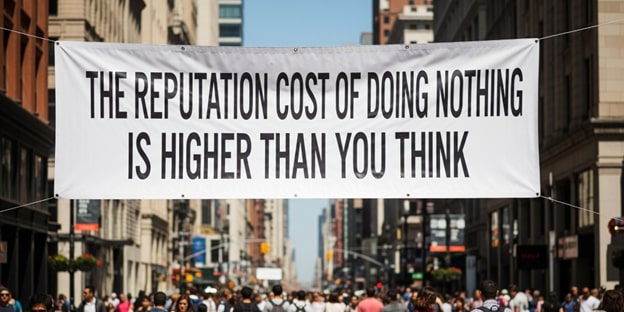The Reputation Cost of Doing Nothing Is Higher Than You Think

It’s not always the scandal that ruins a company’s reputation.
Sometimes, it’s the silence.
The hesitation. The non-response. The decision was to wait just a little longer before taking any action.
When a business fails to act—whether in the face of criticism, a brewing crisis, or even a minor customer complaint—the damage often compounds quietly. By the time leadership steps in, trust is already eroding, momentum is lost, and the public has filled in the blanks on its own.
Inaction is rarely neutral. More often than not, it’s a message in itself—and not a good one.
What Happens When You Do Nothing
Most reputational damage doesn’t start with a massive controversy. It begins with missed signals.
- A product issue that isn’t acknowledged.
- A wave of customer frustration that goes unanswered.
- A cultural shift the brand refuses to engage with.
Each moment of delay sends a signal: either the company doesn’t care, or it doesn’t know what to say. Either interpretation is a problem.
And once trust begins to slip, it’s tricky—and expensive—to get back.
Real-World Lessons From Brands That Stayed Silent
Brands that ignore early warning signs often find themselves at the center of reputational crises that could’ve been avoided.
Take the case of a major beverage company that promoted values of health and transparency—until an investigative report revealed inconsistencies between their marketing and internal practices. Instead of addressing the issue directly, leadership remained silent.
What followed:
- Public backlash
- Declining sales
- Activist pressure
- A years-long recovery process
The damage wasn’t caused by the original issue alone—it was made worse by the refusal to take swift, accountable action.
The True Cost of Inaction
Doing nothing can feel safe in the short term, but it can also lead to long-term consequences. It avoids conflict. It buys time. But that delay carries its own costs:
- Erosion of trust from employees, customers, and partners
- Loss of control over your own narrative as others fill in the gaps
- Reputational drift, where small issues snowball into long-term brand problems
- Reduced stakeholder confidence, especially when transparency is expected
- Opportunity cost, as time and attention are spent cleaning up instead of growing
Inaction isn’t a neutral stance—it’s a reputational liability. One that’s harder and more expensive to fix the longer it’s ignored.
The Upside of Taking Action—Early
When brands respond quickly and decisively, the outcome is almost always better.
A prompt response:
- Signals accountability and leadership
- Helps shape public perception before others do
- Builds goodwill even amid mistakes
- Prevents more minor issues from escalating
- Shows employees and stakeholders that integrity matters
Taking action isn’t about reacting perfectly. It’s about showing up—honestly, consistently, and with a willingness to adapt.
How to Build a Culture That Acts
Waiting for a crisis to hit before taking a stance is a losing strategy. The ultimate goal is to develop systems that identify issues promptly and respond quickly.
Here’s how to get ahead of reputational risk:
- Audit your current risks.
Look at where feedback is being ignored or visibility is lacking. What are your blind spots? - Build a response framework.
Develop an internal process for identifying, assessing, and responding to reputational threats. Don’t leave it to chance. - Empower your team.
Ensure frontline staff, community managers, and PR teams understand what they can say—and when they can say it. - Communicate regularly.
Even when there’s no crisis, let your audience hear from you. Transparency in calm times builds resilience in harder ones. - Track sentiment and public perception.
Utilize tools and qualitative insights to gain a deeper understanding of how you’re being perceived. Don’t wait for a viral moment to pay attention.
Reputation Is a Living Thing—Treat It That Way
You can’t protect your reputation with policy alone.
You protect it with action.
That means listening when people speak up.
Admitting when you’ve missed the mark.
And showing—not just telling—that you’re willing to course-correct.
A company that does this earns trust not because it’s flawless, but because it’s real. And in a marketplace flooded with scripted statements and PR spin, authenticity is the new advantage.
Final Thought
There’s a high cost to doing nothing.
And it rarely shows up on the balance sheet—until it’s too late.
If you’re in a moment where you’re unsure whether to act, remember this:
The silence says something, too.
Make sure it’s not the only thing people hear.

Pranab Bhandari is an Editor of the Financial Blog “Financebuzz”. Apart from writing informative financial articles for his blog, he is a regular contributor to many national and international publications namely Tweak Your Biz, Growth Rocks ETC.






